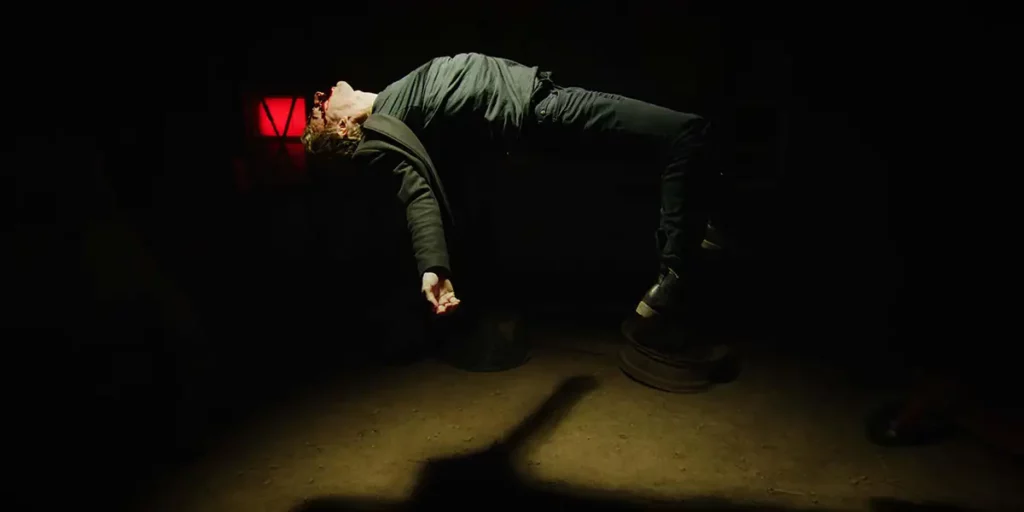The satirical horror of The Exorcism of Saint Patrick exposes the cruel and truly weird hypocrisies of conversion therapy.
Writer-director: Quinn Armstrong
Genre: Horror
Run Time: 90′
US Release: August 27, 2024
UK Release: TBA
Where to watch: In theaters and on demand
The Exorcism of Saint Patrick is far from the type of gory, campy horror that you might assume it to be from the title. Instead, the second feature film from writer-director Quinn Armstrong, and the first in a three-part anthology horror series titled Fresh Hell, is a horror story with a clear and poignant moral compass. It is more of a character study than a straightforward horror, making it more memorable than many gore-laden horror movies of a similar genre.
Michael J. Cline plays Trick, an awkward teenager and son of evangelical Christian parents. These parents recruit Pastor Patrick, or Pastor Pat (Steve Pinder) to request an intensive and gruelling form of conversion therapy for their son.
Armstrong’s screenplay intertwines horror with a biting satire of evangelical America. Trick’s parents are as absurd as they are cruel and bigoted. His mother wants to throw all the family money into the programme. The father is more reluctant to pay Pastor Pat for this one-to-one conversion therapy. Trick’s mother wins this fight with one absurd line that captures the pitch-black humour of the movie: “I’m trying to save our son’s soul. And all you can think about is money.” What starts as a satirical film quickly morphs into a claustrophobic psychological horror that is made all the more memorable by Steve Pinder’s confident performance in the leading role.
Armstrong’s sensitive approach is surprisingly astute when depicting real-world horrors. The horror of the first half of The Exorcism of Saint Patrick ensues from its intense claustrophobia. Pastor Pat imprisons Trick an isolated woodland cabin and subjects him to a series of traumatic psychological treatments that browbeat him into denying his sexuality. Trick is a relatively straightforward victim in the film. His behaviour is driven along by Armstrong’s plot, and he is subject to homophobic bullying and gaslighting by both his parents and the Pastor.
However, his scenes still have a strangely sickly and claustrophobic feel that are likely to get under an audience’s skin. There is squeamish use of body horror in scenes depicting some of the Pastor’s more extreme treatments. These treatments include forcing Trick to drink a mystery liquid that induces nausea, presumably with the purpose of associating romantic feelings with physical pain. The supernatural element comes quite late into The Exorcism of Saint Patrick. The initial claustrophobia of the film’s opening half changes when Trick makes a decision that will dramatically alter the life Pastor Pat.
The plot becomes more and more violent and bloody when the Pastor is haunted by the ghosts of previous ‘clients’ or victims who suffered under his sadistic counselling. Without giving away too much, these haunting scenes are visceral, and the ghosts have a palpable physical power that undermines Pastor Pat’s psychological power and sadism. Despite the change of tone in the final third of the movie, Armstrong maintains a good handle on the film’s tone as it moves from psychological horror to an intense supernatural ghost story.
The majority of The Exorcism of Saint Patrick focuses on the horrors and harmful legacy of homophobia. Yet the strength of Pinder’s performance as Pastor Pat highlights another poignant element within the film. The Pastor, despite being the main antagonist within the movie, is still sensitively depicted. There’s an earnest dedication to restraint in Pinder’s performance that refuses to lean into camp or frenetic acting that would undermine the believability of his character. Horror and pain exist here, but Pinder’s acting is sensitively aware of the years of repression and denial that would have characterised the life of his character.
The Pastor’s squeaky-clean, gently spoken appearance conceals a self-loathing individual who is desperate to escape his identity. Pinder captures the sinister personality of a man who uses evangelical religion as a blunt tool to provoke fear and require obedience. There’s a poignancy in Pinder’s acting as Pastor Pat that hints at the immense hurt that the character has experienced. His scenes are also made all the creepier by intense dialogue that Pinder, in character as Pastor Pat, is able to deliver in way that emphasises the conflicted nature of his character.
For half of his lines in The Exorcism of Saint Patrick, the obviously closeted Pastor could be addressing himself rather than Trick. ‘I have seen people walk the road you’re walking, and there’s not a load of love there. Being gay is a lonely life’. Pinder’s performance is able to evoke sympathy from the audience, even when he is clearly capable of inflicting the type of abuse that have been part of many lived experiences of LGBT+ people.
Ultimately, The Exorcism of Saint Patrick is a carefully balanced horror movie that is just scary enough to retain audience interest throughout its screening length. It maximises the stomach-churning effects of both the opening and scenes and yet Armstrong, as its director, mines the character of the Pastor Pat for an unexpected amount of pathos and sympathy. The Exorcism of Saint Patrick is scary enough to fascinate audiences, but not so stomach-churning that audiences would be distracted from the central human message at the heart of the film.
The Exorcism of Saint Patrick will be released on demand and in select US theaters on August 27, 2024.

